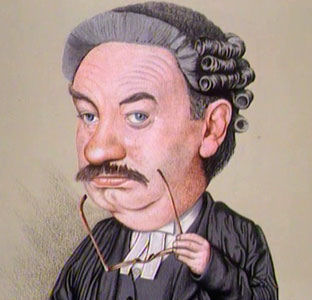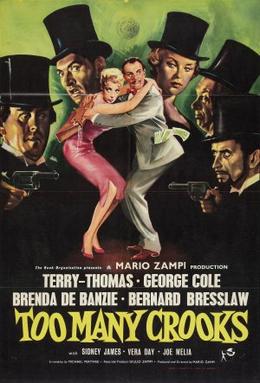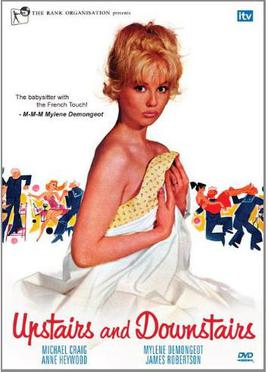
A barrister is a type of lawyer in common law jurisdictions. Barristers mostly specialise in courtroom advocacy and litigation. Their tasks include arguing cases in courts and tribunals, drafting legal pleadings, researching the law and giving legal opinions.

The Paradine Case is a 1947 courtroom drama with elements of film noir set in England, directed by Alfred Hitchcock and produced by David O. Selznick. Selznick and an uncredited Ben Hecht wrote the screenplay from an adaptation by Alma Reville and James Bridie of the 1933 novel by Robert Smythe Hichens. The film stars Gregory Peck, Ann Todd, Alida Valli, Charles Laughton, Charles Coburn, Ethel Barrymore, and Louis Jourdan. It tells of an English barrister who falls in love with a woman who is accused of murder, and how it affects his relationship with his wife.

Mary Genevieve Gaudron, is an Australian lawyer and judge, who was the first female Justice of the High Court of Australia. She was the Solicitor-General of New South Wales from 1981 until 1987 before her appointment to the High Court. After her retirement in 2002, she joined the International Labour Organization, serving as the President of its Administrative Tribunal from 2011 until 2014.

Rumpole of the Bailey is a British television series created and written by the British writer and barrister John Mortimer. It starred Leo McKern as Horace Rumpole, a middle-aged London barrister who defended a broad variety of clients, often underdogs. The popularity of the TV series led to the stories being presented in other media, including books and radio.

Mary Howarth Arden, Baroness Mance,, PC, known professionally as Lady Arden of Heswall, is a former Justice of the Supreme Court of the United Kingdom. Before that, she was a judge of the Court of Appeal of England and Wales.

Helena Florence Normanton, QC was the first female barrister in the United Kingdom. In November 1922, she was the second woman to be called to the Bar of England and Wales, following the example set by Ivy Williams in May 1922. When she married, she kept her surname and in 1924, she was the first British married woman to have a passport in the name she was born with. In October 2021, Normanton was honoured by the installation of an English Heritage Blue plaque at her London home in Mecklenburgh Square.

Brenda Doreen Mignon de Banzie was a British actress of stage and screen.
Dame Janet Hilary Smith,, styled The Rt Hon. Lady Justice Smith, is an English barrister and former High Court Judge and President of the Council of The Inns of Court. She was the judge who prepared The Shipman Inquiry and the Dame Janet Smith Review,.

Witness for the Prosecution is a play adapted by Agatha Christie from her 1925 short story "Traitor's Hands". The play opened in London on 28 October 1953 at the Winter Garden Theatre. It was produced by Sir Peter Saunders.

Passport to Shame, also known as Room 43 and Room Forty Three, is a 1958 British drama film directed by Alvin Rakoff, written by Patrick Alexander and starring Diana Dors and Herbert Lom. A young French woman becomes embroiled in a life of prostitution.

Susan Mary Kiefel is an Australian lawyer and barrister who was the 13th Chief Justice of Australia from 2017 to 2023. She concurrently served on the High Court of Australia from 2007 to 2023, previously being a judge of both the Supreme Court of Queensland and the Federal Court of Australia. Kiefel is the first woman to serve in the position of Chief Justice.

Too Many Crooks is a 1959 British black comedy film directed by Mario Zampi and starring Terry-Thomas, George Cole, Brenda De Banzie, Sidney James, Bernard Bresslaw and Vera Day.

Upstairs and Downstairs is a 1959 British comedy film directed by Ralph Thomas and starring Michael Craig, Anne Heywood, Mylène Demongeot, Claudia Cardinale, James Robertson Justice, Joan Sims, Joan Hickson and Sid James. It features the first English-language performance of Claudia Cardinale.

Doctor at Sea is a 1955 British comedy film, directed by Ralph Thomas, produced by Betty E. Box, and based on Richard Gordon's 1953 novel of the same name. This was the second of seven films in the Doctor series, following the hugely popular Doctor in the House from the previous year. Once again, Richard Gordon participated in the screenwriting, together with Nicholas Phipps and Jack Davies, and once again Dirk Bogarde played the lead character Dr Simon Sparrow. The cast also includes James Robertson Justice and Joan Sims from the first film, but this time playing different characters. This was Brigitte Bardot's first English-speaking film.

I Believe in You is a 1952 British drama film directed by Michael Relph and Basil Dearden, starring Celia Johnson and Cecil Parker and is based on the book Court Circular by Sewell Stokes. Inspired by the recently successful The Blue Lamp (1950), Relph and Dearden used a semi-documentary approach in telling the story of the lives of probation officers and their charges.

The Long Dark Hall is a 1951 British mystery, suspense, courtroom-drama, crime film directed by Reginald Beck and Anthony Bushell and starring Rex Harrison, Lilli Palmer and Raymond Huntley. It was based on the 1947 novel A Case to Answer by Edgar Lustgarten. It was made at Walton Studios.

Not to be confused with What Every Woman Wants.
What Every Woman Wants is a 1954 British comedy film directed by Maurice Elvey and starring William Sylvester, Elsie Albiin, Brenda De Banzie and Patric Doonan. It also features Brian Rix and Prunella Scales. It was based on a play Relations Are Best Apart by Edwin Lewis. It was shot at Walton Studios outside London. The film's sets were designed by the art director John Stoll.

Never Look Back is a 1952 British drama film directed by Francis Searle and starring Rosamund John, Hugh Sinclair and Guy Middleton. The screenplay concerns a newly appointed female barrister whose career is threatened by a former lover. It was made by Hammer Films at the Mancunian Studios in Manchester.
Michael H. v. Gerald D., 491 U.S. 110 (1989), was a case decided by the Supreme Court of the United States involving substantive due process in the context of paternity law. Splitting five to four, the Court rejected a challenge to a California law that presumed that a married woman's child was a product of that marriage, holding that the due-process rights of a man who claimed to be a child's biological father had not been violated.

















